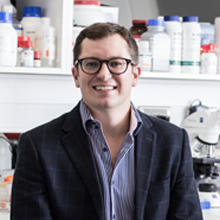An interview with Dr Jonathan Cox
March 2019
Member Dr Jonathan Cox is a Lecturer in Microbiology and Director of the Mycobacterial Research Group at Aston University. Here he talks about his main area of research and collaborating with other research groups around the UK, including the University of Bradford, University of Hertfordshire and University of Plymouth, as well as clinicians at Birmingham Children’s Hospital. He believes everything is achievable if you follow your passion and being a member of the Microbiology Society is important if you want to pursue a career in microbiology.

Tell us a little about your current role.
I am Lecturer in Microbiology and Director of the Mycobacterial Research Group at Aston University. My group consists of three PhD students and one post-doctoral researcher, along with a number of master’s students and undergraduate students who decide to study with us. We are a multidisciplinary team with a diverse skill-set, spanning microbiology, biochemistry, molecular genetics, structural biology and drug discovery. I currently lead teaching for first year microbiology on our Biomedical Science, Biology and Biochemistry courses.
What is your main area of research?
Our main focus is to study the physiology of various pathogenic mycobacteria (such as Mycobacterium abscessus, Mycobacterium tuberculosis and Mycobacterium bovis) and to discover new ways to treat infections. By using the physiology to inform antibiotic drug discovery, we can develop new treatment regimens that are able to overcome factors contributing to antibiotic resistance in these highly antibiotic-tolerant micro-organisms. We collaborate with several other research groups around the UK, including The University of Bradford, University of Hertfordshire and University of Plymouth, as well as clinicians at Birmingham Children’s Hospital.
What are the main research questions that you and your team are trying to answer?
We have two main directions for our current research in terms of improving our understanding of mycobacterial physiology to inform drug discovery. The first is our project to better understand latent tuberculosis (TB) infection and how this physiological change contributes to a loss of sensitivity to many TB drugs. We are using the technology we have developed to discover new small molecule inhibitors of latent TB that may one day make it into the clinic. This work has been funded by a Springboard grant which I was awarded from The Academy of Medical Sciences. Our second research theme is in partnership with Birmingham Children’s Hospital, where we are looking at a mycobacterial infection that is common in children with cystic fibrosis (CF). M. abscessus is originally an environmental mycobacterium; however, it has found a pathogenic niche within the CF lung. My team are analysing clinical isolates for antibiotic sensitivities and using these organisms to inform the development of new treatment combinations.
What research techniques does this involve?
Cloning, biochemistry, sequencing, microbiology, molecular genetics, sensitivity testing etc.
What encouraged you to pursue a career in the field of microbiology?
I discovered a passion for microbiology – in particular microbial physiology, during my undergraduate degree in Biochemistry. I found the topic of antibiotic resistance fascinating and I hoped to be able to contribute towards the development of a solution to the problem. I never could have imagined at the time that I would lead my own research team doing just that. It has been a lot of hard work, but it goes to show that if you follow your passion and commit to it fully, everything is achievable.
Why is it important to be a member of an organisation like the Microbiology Society?
The annual meetings of the Microbiology Society provide an essential platform for early career researchers to present their work to the microbiology community within the UK. They also provide travel bursaries that enable young scientists to attend important meetings and to get their face and their research known. Building a reputation for your work is very important; therefore, I think that membership to the society and attendance of the meetings is an important part of doing microbiology in the UK.
Are you a member and interested in sharing stories about your research journey? Email [email protected]


